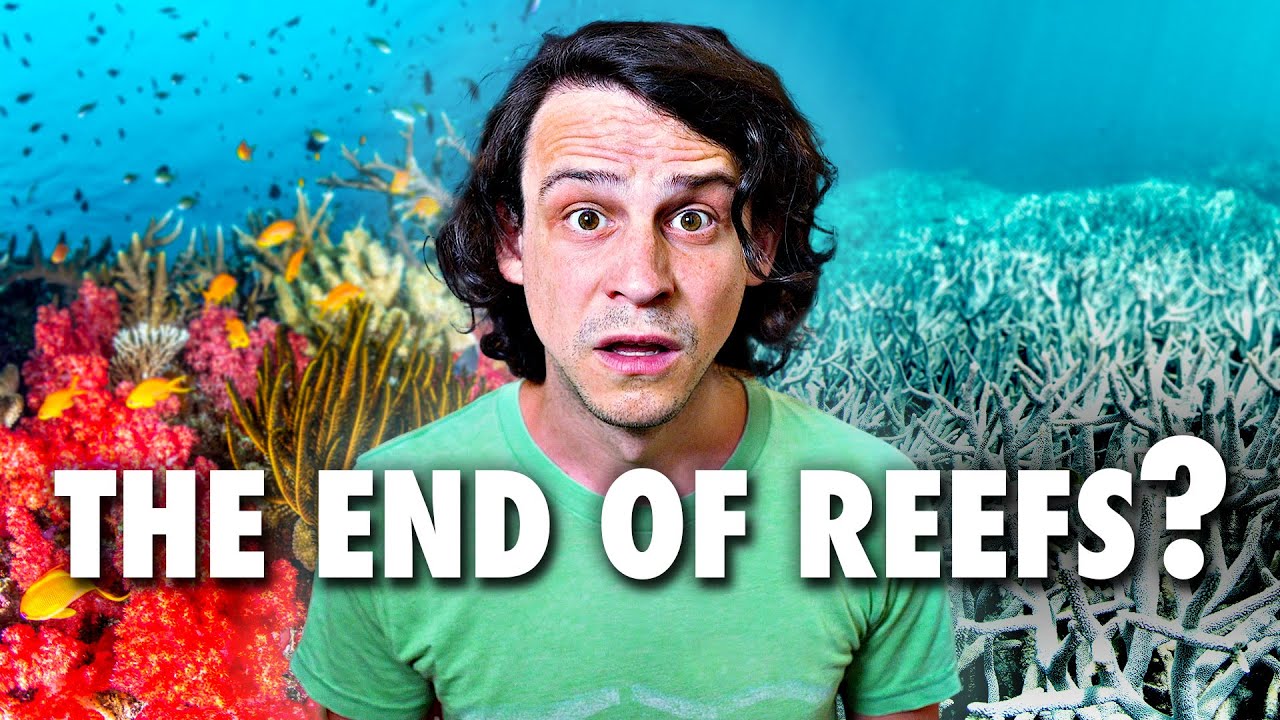
Coral reefs are in hot water… literally. Climate change is ramping up temperatures, causing increasing bleaching of reefs across the world. On top of that, these unique, vital ecosystems are facing threats from plastic pollution, ocean acidification, and overfishing. And new research shows just how in danger the Great Barrier Reef is. But there are solutions to protect reefs from global warming – helping them adapt to a warming world and removing the threats they face. But if we don’t stop climate change as soon as possible, we may live to see the end of coral reefs.
Support ClimateAdam on patreon: http://patreon.com/climateadam
#ClimateChange #greatbarrierreef #coralreef
twitter: http://www.twitter.com/ClimateAdam
instagram: http://instagram.com/climate_adam
==MORE INFO==
My video for @DWPlanetA https://www.youtube.com/watch?v=2CrkeFERaZo
The new study on great barrier reef https://www.nature.com/articles/s41586-024-07672-x
News & Views (from an external researcher) discussing study: https://www.nature.com/articles/d41586-024-02329-1?WT.ec_id=NATURE-20240808&sap-outbound-id=B88306D76D18FBB17887652E05D02D0FF0487041
Some positive news on restoring reefs: https://www.sciencedaily.com/releases/2024/03/240308123248.htm
Recovery (and pause in recovery) of great barrier reef: https://www.aims.gov.au/information-centre/news-and-stories/pause-recent-coral-recovery-much-great-barrier-reef
2023 / 2024 status of Great Barrier Reef https://www.aims.gov.au/monitoring-great-barrier-reef/gbr-condition-summary-2023-24
Loss of thermal refugia for world’s reefs https://www.researchgate.net/publication/358315105_Future_loss_of_local-scale_thermal_refugia_in_coral_reef_ecosystems
Survey finding three quarters of reefs affected https://icriforum.org/gbr-bleaching-2024/
Coral reef recovery vs bleaching https://www.aims.gov.au/information-centre/news-and-stories/great-barrier-reef-reviving-or-dying-heres-whats-happening-beyond-headlines
==CREDITS==
Boulder coral photo from Philippe Bourjon
Adapting reefs clips from World Economic Forum & NOAA Sanctuaries
Bleaching photo from Stop Adani
source







I love that I'm able to make videos like this, without having to sell you all junk you don't need. that's thanks to incredible patrons like Michael Link. join them here: https://www.patreon.com/ClimateAdam
Time to start a plant based diet
I haven't watched your videos for a while because, honestly, I'm finding ongoing climate change too depressing to even think about.
It seems to me that while the environmentalists have good reason to despair, everyone else is becoming so very much more divided politically. Environmental concerns for the near future have become no more than 'minor annoyances' – while they have been given far more important things to think about.
An old friend of mine is now enduring temperatures of 40 Celsius for the second time this year.
Another fled her home for the coast when wildfires encroached last year (they missed, thank goodness, but it was close).
And this is the thing, so msny more of us are either getting caught up in extreme weather events, or personally know other people who have…and 'still' nowhere near enough is being done.
It's almost like our politicians are trying to distract us from pressuring them to act by throwing even more immediate problems at us.
Usually, I buy in a load of trees to plant over the Winter season. Have done every year for decades. Can't afford it this year. Everything's just far too expensive.
Earlier this week, I looked over my little bit of land at partly finished planting projects and I wondered if it is worth carrying on any more.
I first heard about climate crisis killing tropical coral reefs at 1C maybe a couple decades ago. Looks like we decided 'who cares about reefs', the quip at the British conference of that time.
Welcome Climates!!!
I can't remember the details, but there is a project based out of the IUI (I think it was the IUI) in Eilat, Israel that has been specifically working to identify heat tolerant coral species from reefs in the Gulf of Aqaba, which as a region has naturally endured big temperature swings, being an enclosed, effectively tideless bay locked in by extreme desert environments. The coral species there were found to be exceptionally tough, and there is an idea of using these corals as pioneer species on degraded reefs around the world to help kick-start their recovery.
It's controversial and I must admit I'm personally very much in two hearts about it. I'm from Aus, and the plight of the GBR absolutely tears my heart to shreds, but I just don't feel deliberately introducing an invasive species specifically selected for it's survival ability is a good idea. It could very easily displace our own native coral species that it is meant to help restore, and we wind up with a denuded monocultural reef unable to host the complex symbiosis our reef is based on as the source of it's vitality and abundance.
Instead, I feel we should be doing this work outselves in Australia, finding potential pioneers that already exists here on our reefs that we know can integrate well into a wider Pacific reef ecosystem. The reefs of our northern coast around Darwin are poorly studied, but are well adapted to extreme heat variations, as well as stressors such as big swings in salinity, depth, turbidity and nutrient loading from being in a mega-tidal environment, with strong moonsoonal influences suddenly dumping huge amounts of fresh, nutrient rich, sediment heavy waters from the rivers onto the reefs. These northern reefs need to be understood, as to some extent they are already living in the dystopian future we are trying to hard to bring about for ourselves.
What survives climate change are those species that either have a very wide variability or out reproduce the speed of change.
Do the polyps of the coral reefs fit either?
At this point, growing awareness is a great thing to do. Hopefully, people will realise the impact of our choices and steer away from the crisis we're causing.
Perhaps you can understand when I say the oceans are lost to us, as it is not just global warming doing it. It isn't ocean acidification either. Acidification would do it, but the thing that kills the oceans is our hunger for protein sources. We will fish out the oceans by 2035. Industrial fishing will be over. It will be hard to find areas not affected by deoxygenation or acidification at that point. Traditional fisheries will have collapsed. I think total collapse of sea food resources was set for 2048.
So, first we must find a way to replace the amount of protein we extract yearly with something grown. We have to solve the issues of excess nitrogen and phosphorus leaching into waterways. Find ways to reverse ocean acidification. And I don't think we have the first clue on how to do any of those things.
I would live to be wrong!
Please tell my I am wrong!
If I am correct, or even off by a bit, the point is… the oceans are done. It can be a powerful thing to accept reality. It informs you on what things are possible. If the oceans can not be saved, then we can go all "mad chemist" and find ways to use the oceans to fight global warming.
We really need to get our heads screwed on straight. We need traction on the temperature gauge. Just restraining the continual slow warming is not enough. We will have to pull it back a ways too. We need the oceans…
I'm interested in understanding how David Ridd comes up with an opinion that seems at odds to the information you provide.
Another great video Adam… but. I think you're opening and message will resonant keenly with those who already have some understanding of the changing climate and are looking to understand more. Presumably, for example, ships are routed through the GBR because it is cheaper (or maybe its because the more direct route will reduce emissions?). Even if only cheaper in the short term or because external costs aren't factored in, this left me wondering if a narrative that focused more on the human impact of losing corrals could better motivate change?
for the ALGORITHMJESUS!
It's the end of everything.
Love your videos! Very informative. Thank you!
We need to develop more coalitions of the willing – collaboration climate-change warriors, collaboration.
Adam, your passion to care for our beautiful world and the climate is inspiring. Thank you so much for this channel.
We’ve been at 1.5 for the last 13 months.
Such utter none sense.
Such silly stuff
There is no climate crisis.
Keep on spreading fear Adam. Keep it up.
So reefs are like clothing, you should avoid hot water and bleaching to keep the colors. Well with the cost of living nowadays, can't afford to raise the environment bill too!
More taxes and real pollution please ! Sign me up lol
I would love to think that coral reefs will be here for my grandchildren
but unless we stop CO2 emissions, they will not.
Next time is a lol Bcause I
UN-F'n-SUB click baiters ✅
Our human conundrum: we know what we're doing but we don't know how to stop it
Glad mentioned breeding and seeding them. Once we stabilize GW, the Red Sea strains hsve Hot genetics 🧜♀️
Rebuild then
Coral reefs are amazing.
thank you, it will change soon, there are other source of energy that with international cooperation in coastline, we can reduce global warming, sea is huge source of energy, further more we can prevent these phenomena like cyclone and flood and wildfire by using this hot seasonal atmospheric condition, recent years in summer, geothermal energy happens in surface of coastline, there are many countries in coastline with seasonal hot weather and water condition, in sum-up, by using this energy not only is economical but also reduce global warming in countries like Japan, China, India, Mediterranean countries, Iran, Mexico, Us, Canada, (Africa and Arabian countries….) . I invented new method base on air pressure rules and quantum physics ionization sea water minerals in strong dynamic magnet and electrical field and electric chemical reactions as part of fuel for producing electricity and fresh water and fertilizer. 7 zero pollution methods for reducing global warming I mentioned in my profile.
There's no sign that 2023 qualifies as "freakishly hot" -looking a lot more like an acceleration.
Hi Adam, I hope you get some house plants soon. ❤
At the end of '26, no reefs South of the equator will remain unbleached. They'll all be dead by '28. A hundred million humans dead by '30. It's time to start asking ourselves how we want to go out. A kind of hospice.
No. Bank’em.
No sponsors? You're a dream ❤😂
30°C in September measured for the very first time in Norway today!
"And you havent discovered empathy" 😂
Your hair is looking fabulous homie 👍!
Thanks for
The waters around Rottau have boon too cold for coral. How about now? 😅